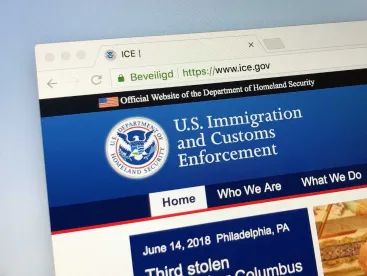The Butler County, Pennsylvania, prison board recently voted unanimously to reverse policies that had prevented county prison officers from cooperating with Immigration and Customs Enforcement (“ICE”) to remove deportable inmates. The new policy requires the prison warden to provide ICE with a list of inmates each week, grant ICE officers access to the prison to interview inmates, give ICE “adequate notice” of criminal noncitizen releases and transfers, and honor ICE detainers. The decision reflects a larger, ongoing debate among jurisdictions about the enforcement of immigration law.
What are Sanctuary Cities or Counties?
Sanctuary cities or counties are local jurisdictions with policies or practices in place to limit cooperation with federal immigration authorities, particularly ICE. These policies can take various forms, such as declining to honor ICE detainers (requests for local law enforcement agencies to hold individuals suspected of being in the country illegally) or prohibiting local law enforcement from inquiring about a person’s immigration status. Sanctuary policies are aimed at creating a safe environment for undocumented immigrants to report crimes, access public services, and participate in their communities without fear of deportation. However, these policies are controversial and have sparked debates over public safety, federalism, and immigration enforcement.
Butler County Reverses Stance on Immigration
The county’s previous policy prevented officers from complying with an ICE detainer, which resulted in Butler County being identified as a sanctuary county, but the county recently made efforts to change course. This change was initiated by Stephenie Scialabba, a state lawmaker representing a district near Pittsburgh, who was alerted to the policy by a constituent. Scialabba said the previous policy made the county seem like “a safe place to commit crimes.”
Butler County officials agreed with Scialabba, stating that they welcome and encourage legal immigration, but pointing to drug trafficking issues they are seeing in Butler County. The district attorney said local crime is no longer limited to DUIs and retail theft, but also includes drugs, which are being brought in by illegal noncitizens.
Sanctuary Policies Across the Country
The Center for Immigration Studies (the “Center”) has identified about 300 jurisdictions in the country that have policies, ordinances, or state laws prohibiting full cooperation with ICE. In contrast, some states, including Texas, Iowa, and Florida, have enacted laws banning local sanctuary policies. And some jurisdictions like Cook County, Ill., Philadelphia, and New York City will likely never allow full cooperation with ICE absent meaningful incentives and penalties implemented through changes to state or federal laws.
Sanctuary policies for immigrants reflect a shifting attitude toward immigration in the United States, with an increasing number of large cities trending toward these policies. The idea of sanctuary policies has gained traction in recent years, particularly in response to the Trump administration’s aggressive immigration policies, which included a crackdown on undocumented immigrants and threats to withhold funding from sanctuary jurisdictions. Many cities with large immigrant populations have embraced sanctuary policies as a way to protect their residents from deportation and to ensure that local law enforcement resources are focused on public safety rather than immigration enforcement. Proponents of sanctuary policies argue that they promote trust and cooperation between immigrants and law enforcement, which can lead to safer and more inclusive communities. But opponents argue that they undermine the rule of law, encourage illegal immigration, and jeopardize public safety by releasing criminals back into the community.



 />i
/>i
